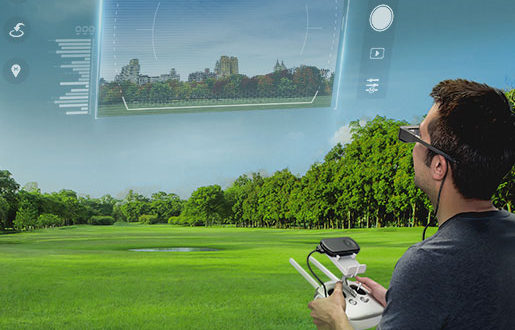It’s almost impossible to see the Epson Moverio augmented reality (AR) glasses demonstrated and not immediately want to try them out. It’s not just the cool glasses – or the drone – it’s the “wooooaaah” that just about every person who puts them on comes out with that makes you want to shove your way into the line to see what they see.
When DRONELIFE got a chance to spend some time with Eric Mizufuka, Epson’s New Markets Product Manager, at the recent Commercial UAV Expo in Las Vegas we got the full experience – and let out a few “wows” of our own.
The Epson Moverio BT-300, to give the smart glasses their full name, are wearable technology – lightweight, comfortable see-through glasses – that allow you to see digital data, and have a first person view (FPV) experience: all while seeing the real world at the same time.
The applications are almost endless. But we’ll start with the fact that the smart glasses enable drone operators to get the advantages of FPV technology while still maintaining the visual line of sight (VLOS) required by current US drone regulations. And it isn’t just an alternative to VLOS flight with a smartphone or tablet, it’s better – because you don’t have to keep looking down at your tablet to make sure you’re capturing the right data while still keeping track of your drone in the sky. They even come with special shades, for use out in the sun.
Eric Mizufuka says that there is an incredible amount of information that can be easily understood visually with the glasses. “The sky is a blank canvas,” says Eric. “You can display all kinds of digital data in the sky.” With the glasses, you can have a pre-flight visual experience to plan your flight, showing obstacles not just from a top-down perspective but with information about height and shape, also. No fly zones and other restrictions can be rendered, giving the operator real time data about the “sky highway.” It’s not just green lights and pictures that you can see with the Moverio smart glasses. They can render full 3D holograms, making black totally transparent – which they demonstrated with a fun display of little cartoon ghosts that looked solid enough to jump into your lap.
In addition to pre-flight visualization and in-flight assistance, the glasses are a wearable camera. The camera can document the entire flight experience, allowing enterprise customers to monitor safety and performance, and ensure that the entire drone fleet is operating according to their standards. The glasses can provide post-flight visualization experiences, with an off-line viewer – operators could show clients 3D models and large screen projections of the footage that has been captured. “It’s kind of a productivity suite on the go,” says Mizufuka.
Image converted using ifftoany
Augmented reality technology isn’t brand new – the technology is already heavily used in medical, dental, or other field operations where it serves as an “over the shoulder coaching experience.” Mizufuka says that Epson’s been at the forefront of augmented reality development: “While most people know us as a printer company, we’re a technology company – our real strength is R&D,” says Mizufuka. “Epson is a leader in projection technology as well – and that’s what it takes to excel at smart glasses.” The glasses are made of very complicated components, and Epson has been among the first to develop lightweight lenses that can be mass produced. The Moverio feature purpose built technology for smart glasses – the projection piece was built from scratch. And the glasses are not Epson’s only investment in the drone industry – they also produce sensors used in some of the highest end commercial drones to measure pitch, roll and yaw with incredible precision.
Epson has partnered with DJI, the world leader in consumer drones, to get the technology out to the drone industry. The partnership will take a phased approach: as a first phase, target=”_blank”> target=”_blank”>DJI will upload the GO app to the Moverio marketplace, and support the Moverio platform.
Mizufuka says the industry is ready for this next step in drone technology. “Drone hardware has matured to a point where you have safe, easy to fly, robust systems,” he says. “Advanced visualization is the next revolution – it’s going to push the industry to be safer, more productive, and more enjoyable.”
